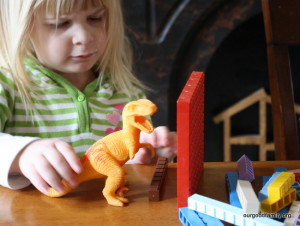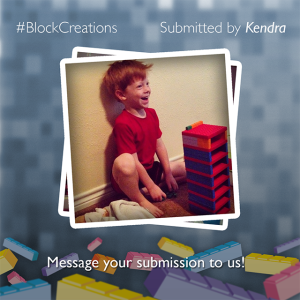
In an article entitled “Why Slowing Down Stimuli to Real Time Helps a Child’s Brain,” NPR journalist Eric Westervelt wrote about the power of playing with blocks.
Westervelt shared insights from Dr. Dimitri Christakis – a man who has done extensive research on blocks and play and who lectures on the effects of media on children. Of particular note was an experiment run by Dr. Dimitri. This study took 200 children from low-income backgrounds and randomly divided them into two groups.
“One group got a set of large building blocks, that are intended for young children, at the beginning of study. And one got them at the end of the study, six months later. In the group that got the blocks at the beginning, we also gave parents a list of what we call “blocktivities.” So these were simple ways to play with your child with blocks: stack the blocks, sort the blocks, divide them by color, etc. We had them keep daily diaries so we know how many kids played with blocks in a typical day.”
6 months later, Dr. Dimitri looked at the children’s language development.  “The control group, those that did not get the blocks, scored in the 42nd percentile — meaning they were slightly below average. Which is unfortunately not uncommon for a low-income population. But the group that got the blocks scored in the 52nd percentile — so, slightly above average and significantly and clinically different from the control group.”
Dr. Dimitri writes:
So having blocks — and more importantly having activities that promote caregiver and child interaction — resulted in significant improvements in language over just a six-month period.
And adds that:
There is nothing special about blocks insofar as they provide an excellent platform for parents and children to engage with one another. But what is somewhat unique about blocks is that they’re a great venue! Children love them and like to play with them both with their parents and on their own. In fact, in our study of blocks, what we found is that children played with their fathers much more with blocks than with their mothers.
As the CEO of Demme Learning, I am well aware of the power in playing and building with blocks. Our math curriculum (Math-U-See) teaches conceptually by having students use blocks to build and solve problems. Interestingly enough, many of the kids who use our blocks for school *work* also enjoy playing with the blocks (as pictured above.)

On our Instagram account, we use the hashtag #BlockCreations. Many of our followers send in photos using the hashtag for us to share. It is evident from these photos that the blocks are a beloved means of exploration and self-expression.
Of course, Math-U-See doesn’t have a monopoly on blocks. I remember spending countless hours playing with simple wooden blocks and building things with Lincoln logs and lego.
The key is not just the blocks themselves but also the parental engagement. Parents, spend time playing with blocks alongside your children. The conversations that naturally spring up during this time along with the emotional nurturing can lead to an incredible amount of development. Besides, playing with blocks is fun.